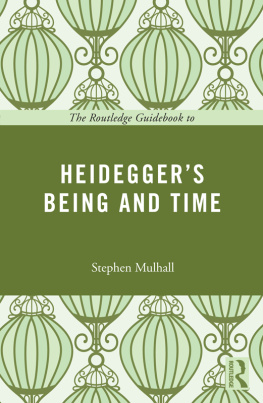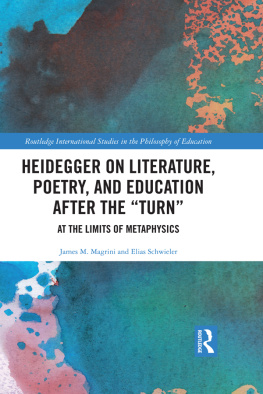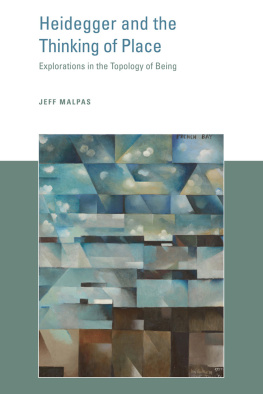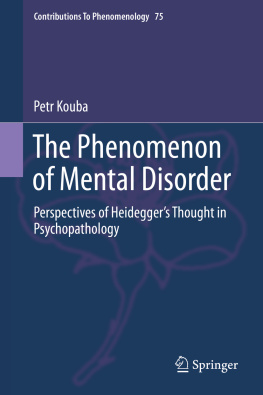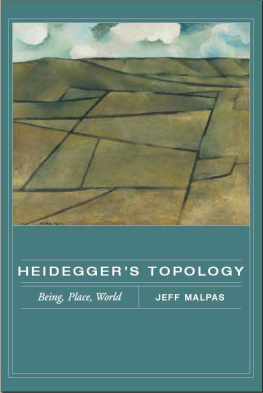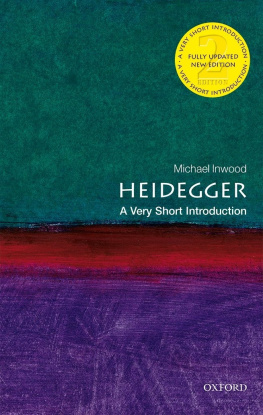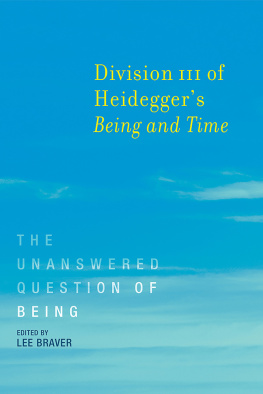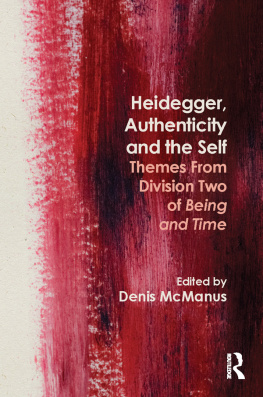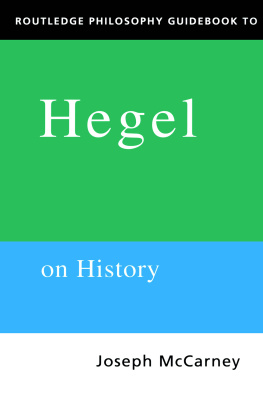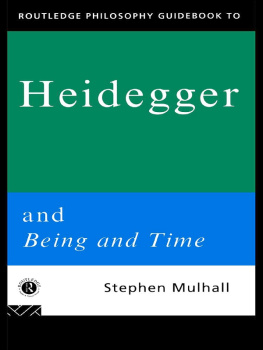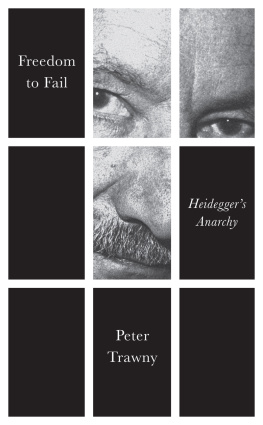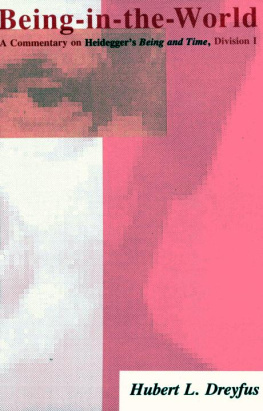Routledge Guides to the Great Books
The Routledge Guidebook to Heideggers Being and Time
Being and Time is considered to be one of the most important philosophical texts of the twentieth century and its influence can be seen in existentialism, metaphysics, postmodernism and more. But the author, Martin Heidegger, was a controversial figure and his writing can be very daunting for the first time reader.
The Routledge Guidebook to Heideggers Being and Time offers a route through this classic text by exploring:
- The context of Heideggers work and the background to his writing
- Each separate part of the text in relation to its goals, meanings and impact
- The enduring legacy and influence of Heideggers work
Following Heideggers text closely, this guidebook is essential reading for all students of philosophy, and all those wishing to gain an understanding of this classic work.
Stephen Mulhallis Fellow & Tutor in Philosophy at New College, University of Oxford.
ROUTLEDGE GUIDES TO THE GREAT BOOKS
Series Editor: Anthony Gottlieb
The Routledge Guides to the Great Books provide ideal introductions to the work of the most brilliant thinkers of all time, from Aristotle to Marx and Newton to Wollstonecraft. At the core of each Guidebook is a detailed examination of the central ideas and arguments expounded in the great book. This is bookended by an opening discussion of the context within which the work was written and a closing look at the lasting significance of the text. The Routledge Guides to the Great Books therefore provide students everywhere with complete introductions to the most important, influential and innovative books of all time.
Available:
Aristotles Nicomachean Ethics Gerard J. Hughes
Hegels Phenomenology of Spirit Robert Stern
Heideggers Being and Time Stephen Mulhall
Lockes Essay Concerning Human Understanding E. J. Lowe
Platos Republic Nickolas Pappas
Wollstonecrafts A Vindication of the Rights of Woman Sandrine Bergs
Wittgensteins Philosophical Investigations Marie McGinn
Forthcoming:
De Beauvoirs The Second Sex Nancy Bauer
Descartes Meditations on First Philosophy Gary Hatfield
Galileos Dialogue Maurice A. Finocchiaro
Hobbes Leviathan Glen Newey
Mills On Liberty Jonathan Riley
Routledge Guides to the Great Books
The Routledge Guidebook to: Heideggers Being and Time
Stephen Mulhall

First edition published in the Routledge Philosophy Guidebook Series in 1996 Second edition published in the Routledge Philosophy Guidebook Series in 2005 First published in The Routledge Guides to the Great Books Series in 2013
by Routledge
2 Park Square, Milton Park, Abingdon, Oxon OX14 4RN
Simultaneously published in the USA and Canada
by Routledge
711 Third Avenue, New York, NY 10017
Routledge is an imprint of the Taylor & Francis Group, an informa business
1996, 2005, 2013 Stephen Mulhall
The right of Stephen Mulhall to be identified as author of this work has been asserted by him in accordance with sections 77 and 78 of the Copyright, Designs and Patents Act 1988.
All rights reserved. No part of this book may be reprinted or reproduced or utilised in any form or by any electronic, mechanical, or other means, now known or hereafter invented, including photocopying and recording, or in any information storage or retrieval system, without permission in writing from the publishers.
Trademark notice: Product or corporate names may be trademarks or registered trademarks, and are used only for identification and explanation without intent to infringe.
British Library Cataloguing in Publication Data
A catalogue record for this book is available from the British Library
Library of Congress Cataloging in Publication Data
The Routledge guidebook to Heideggers Being and time / Stephen Mulhall.
p. cm. (The Routledge guides to the great books)
Rev. ed. of: Routledge philosophy guidebook to Heidegger and Being and time. Includes bibliographical references (p. ) and index.
1. Heidegger, Martin, 1889-1976. Sein und Zeit. I. Mulhall, Stephen, 1962- Routledge philosophy guidebook to Heidegger and Being and time. II. Title.
B3279.H48S46654 2013
111dc23
2012016463
ISBN: 978-0-415-66442-4 (hbk)
ISBN: 978-0-415-66444-8 (pbk)
ISBN: 978-0-203-08431-1 (ebk)
C ONTENTS
P REFACE
Martin Heidegger was born in Messkirch on 26 September 1889. An interest in the priesthood led him to commence theological and philosophical studies at the University of Freiburg in 1909. A monograph on the philosophy of Duns Scotus brought him a university teaching qualification, and in 1922 he was appointed to teach philosophy at the University of Marburg. The publication of his first major work, Sein und Zeit (Being and Time), in 1927 catapulted him to prominence and led to his being appointed to the Chair of Philosophy at Freiburg in 1928, succeeding his teacher and master, the phenomenologist Edmund Husserl. From April 1933 until his resignation in February 1934, the early months of the Nazi regime, he was Rector of Freiburg. His academic career was further disrupted by the Second World War and its aftermath: in 1944, he was enrolled in a work-brigade, and between 1945 and 1951 he was prohibited from teaching under the deNazification rules of the Allied authorities. He was reappointed Professor in 1951, and gave occasional seminars in his capacity as Honorary Professor until 1967, as well as travelling widely and participating in conferences and colloquia on his work. He continued to write until his death on 26 May 1976. He is buried in the local graveyard of his birthplace, Messkirch.
This brief biographical sketch leaves much that is of importance in Heideggers life (particularly his destructive and ugly relations with Nazism) unexplored; but it gives even less indication of the breadth, intensity and distinctiveness of his philosophical work and its impact on the development of the discipline in Europe. The publication of Being and Time transformed him from a charismatic lecturer, well known in German academic life (Hannah Arendt said that descriptions of his lecture series circulated in Germany as if they were rumours of a hidden king), into a figure of international significance. A steady stream of lectures, seminars and publications in the following decades merely broadened and intensified his influence. Sartrean existentialism, the hermeneutic theory and practice of Gadamer, and Derridean deconstruction all grew from the matrix of Heideggers thought; and the cognate disciplines of literary criticism, theology and psychoanalysis were also importantly influenced by his work. To some, his preoccupations and, more importantly, the manner in which he thought and wrote about them signified only pretension, mystification and charlatanry. For many others, however, the tortured intensity of his prose, its breadth of reference in the history of philosophy, and its arrogant but exhilarating implication that nothing less than the continuation of Western culture and authentic human life was at stake in his thought, signified instead that philosophy had finally returned to its true concerns in a manner that might justify its age-old claim to be the queen of the human sciences.
This book is an introduction for English-speaking readers to the text that publically inaugurated Heideggers life-long philosophical project
Next page
